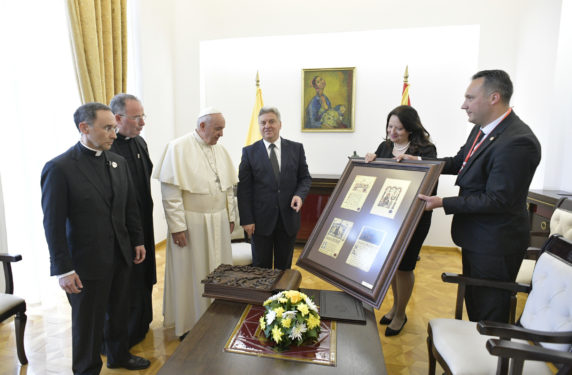
By Elise Harris
(Crux) SKOPJE – When Pope Francis landed in Skopje, North Macedonia Tuesday, he offered a different tone than his visit to neighboring Bulgaria, praising the nation for their welcome of migrants and refugees.
In his speech to Macedonian authorities after landing in the nation’s capital May 7, Francis thanked the “generous efforts” made by the republic and organizations such as the Red Cross, the Catholic charity Caritas, and other NGOs, “to welcome and provide assistance to the great number of migrants and refugees coming from different Middle Eastern countries.”
For the thousands who began pouring into Europe in 2015-2016 when the migration crisis exploded, crossing Macedonia in hopes of making it to northern and western European nations, “they found a secure haven” in Macedonia, he said, adding that the solidarity offered to those who left their homes and families “does you honor.”
After the crisis began in 2015, the Balkan route through Europe was closed in March 2016, leaving several thousand migrants and asylum seekers stranded in Macedonia, unable to make it further. Macedonia has since housed migrants in centers, offering support and attending to basic needs.
Francis voiced hope that North Macedonia “will cherish the chain of solidarity that emerged from that emergency, and thus support all volunteer efforts to meet the many different forms of hardship and need.”
The pontiff landed in the North Macedonian capital of Skopje May 7, where he will spend just 10 hours visiting the poor and meeting with the nation’s tiny Catholic minority and representatives from other religious communities before heading back to Rome.
Macedonia is a majority Orthodox country, where Catholics make up just one percent of some two million inhabitants. The pope’s visit falls during the 25th anniversary of the establishment of diplomatic relations with the Holy See in 1994, and just three months after the nation changed its name in February, ending a decades-long dispute with Greece, which also has a region called Macedonia.
Skopje is also the birthplace of St. Teresa of Calcutta, commonly known as “Mother Teresa.” Born Anjeze Gonxhe Bojaxhiu to Albanian parents in 1910 when the country still belonged to the Ottoman Empire, the “saint of the gutters” died in 1997 after spending her life serving “the poorest of the poor” in the slums of India.
She founded the globally recognized Missionaries of Charity order, and in 1979, she won the Nobel Peace Prize for her service to the poor. During his visit, Francis will meet with the poor at the shrine dedicated to Mother Teresa, which is located at the site of the church of the Sacred Heart, where Mother Teresa was baptized.
In his speech the pope recognized the nun, whom he canonized in 2016 during his Jubilee of Mercy, saying she “pioneered a specific and radical way of devoting one’s life to the service of the abandoned, the discarded, and the poorest of the poor.”
“She carried out her apostolate of humble and complete self-giving in India and, through her sisters, reached out to the most varied geographical and existential peripheries,” he said, adding, “you are rightly proud of this great woman.”
Francis also pointed to the diverse cultural and religious makeup of Macedonia, calling it “a bridge between East and West and a meeting-point for numerous cultural currents, (that) embodies many of the distinctive marks of this region.”
With Christian roots dating back to the time of the apostles, North Macedonia has a rich millennial culture reflected in the multiethnic and multi-religious countenance of its people, he said, adding that “this crucible of cultures and ethnic and religious identities” has led to a peaceful and enduring coexistence in which individual identities have developed “without rejecting, dominating or discriminating against others.”
These relationships, he said, can serve as a reference point for mutual respect and for an increased integration with the nations of Europe. For several years North Macedonia has sought to enter NATO, but its entrance has been blocked by Greece due to the dispute over its name. With the change now becoming official, the door has theoretically been opened.
Francis voiced hope that further integration with other European nations “will develop in a way that is beneficial for the entire region of the Western Balkans, with unfailing respect for diversity and for fundamental rights.”
Noting how the country boasts of Orthodox, Muslim, Jewish, Catholic and other Christian religious communities, as well as ethnic differences between Macedonians, Albanians, Serbs, Croats and others, he said this diversity has created “a mosaic in which every piece is essential for the uniqueness and beauty of the whole.”
“That beauty will become all the more evident to the extent that you succeed in passing it on and planting it in the hearts of the coming generation,” he said, urging that every effort be made “to enable the diverse religious expressions and the different ethnic groups to find a common ground of understanding and respect for the dignity of every human person.”
“Indeed, those efforts will serve as the necessary seedbed for a future of peace and prosperity,” he said, and pointed to the example of Saints Cyril and Methodius, two brothers highly revered by both Catholics and Orthodox for evangelizing the Slavic world.
Francis urged North Macedonia to continue the path they have taken, increasingly becoming “a beacon of peace, acceptance and fruitful integration between cultures, religions and peoples. Drawing from their respective identities and the vitality of their cultural and civil life.”

When I was a stranger and homeless – you welcomed me, says the Lord.